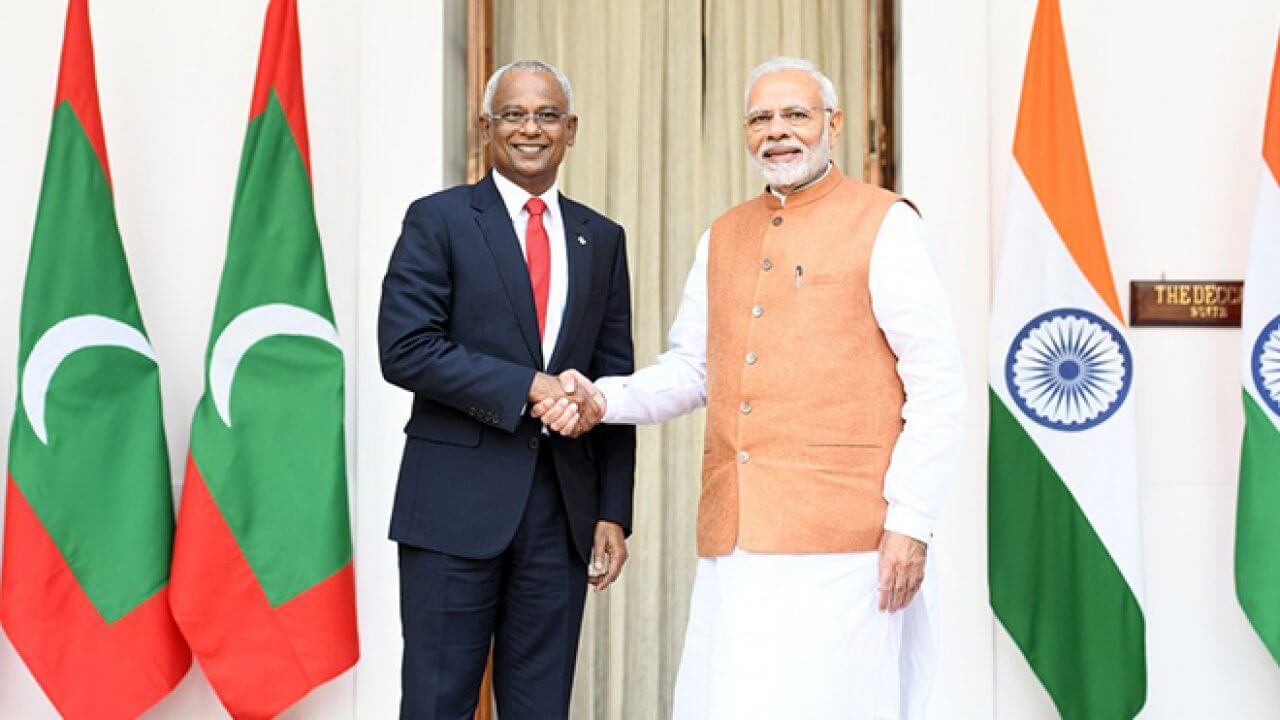On Monday, India and the Maldives concluded a Line of Credit (LoC) Agreement for $400 million, which is aimed towards completing the Greater Male Connectivity Project (GMCP). The Indian High Commission in the Maldives said, “$400 million LoC Agreement concluded for the implementation of the Greater Male Connectivity Project – single-largest connectivity & infrastructure project in the Maldives; a national economic engine connecting Hulhumale, Hulhule & Male with the proposed Gulhifalhu Port & Thilafushi!”
The GMCP aims to create a 6.7 km bridge to improve connectivity to crucial locations in the Maldives. Yesterday’s meeting was in furtherance of an announcement by India’s Minister of External Affairs S. Jaishankar in early August for a $500 million package to the Maldives, comprising of $100 million in grants and $400 million as a line of credit. Revealing the package in a video conference alongside his Maldivian counterpart Abdullah Shahid, Jaishankar had said that this “will be the largest civilian infrastructure project in Maldives, connecting Male with three neighbouring islands – Villingili, Gulhifahu (where a port is being built under India LoC) and Thilafushi (new industrial zone) – by construction of a bridge-and-causeway link spanning 6.7 km”. Earlier this month, India also announced its decision to fund a “100-bedded cancer hospital” and a “22,000-seater cricket stadium in Maldives.”
The Maldivian side, too, celebrated the completion of the deal. Shahid said, “The Greater Male Connectivity Project will lead to greater possibilities. It is the gateway to a more developed & economically resilient nation. Thank you for partnering with the Maldives in delivering this project with $100 million of grant and $400 million Line of Credit.” On completion, the project is expected to overtake the Maldives-China Friendship Bridge as the “most visible” connectivity project and will render the Chinese construction as “insignificant.”
The agreement was signed between Maldivian Finance Minister Ibrahim Ameer and the General Manager of India’s Exim Bank, Nirmit Ved. This is the third such LoC, cumulatively worth $1.2 billion, signed between the Exim Bank and the Maldivian government. A representative of the bank said that these “soft loans” to the Maldives had helped fund “connectivity, water, sewage projects, Addu Development Project, an international cricket stadium, Gulhifalhu port, Hanumaadhoo airport and construction work” in the country. Currently, the bank also has 266 LoCs with countries in Africa, Asia and Latin America for similar infrastructure and development projects.
For India, these moves are crucial to counter Chinese efforts in the Maldives, which is now more vulnerable to Beijing’s predatory economic policies after the COVID-19 outbreak severely damaged its thriving tourism industry. Even prior to the ongoing pandemic, India was growing increasingly concerned about China’s rising influence in Male, with ex-President Abdulla Yameen spearheading closer ties with the East Asian giant. During Yameen’s tenure, the Maldives gathered a debt of over $2 billion with China. However, over the past two years, since the election of President Ibrahim Mohamed Solih, New Delhi’s relationship with the Maldives has been “reset”.
In fact, shortly following the GCMP announcement, reports started emerging that the Maldives is reconsidering its Free Trade Agreement (FTA) with China, which was finalised during Yameen’s tenure. According to the Maldives’ Economic Minister, Fayyaz Ismail, the FTA with China is acting as a hindrance to trade relations between the Maldives and other countries like Dubai, Singapore and India. He said, recalling his opposition to the agreement when it was being signed in 2017, “My personal opinion is that the FTA is unacceptable and should not have been signed.”
Maldives Considers Scrapping FTA With China Following $400 Million Deal With India
The $400 million deal between India and Maldives in a Line of Credit Agreement for the completion of a 6.7 km bridge to improve connectivity between the two countries.
October 13, 2020

Indian Prime Minister Narendra Modi with Ibrahim Mohamed Solih, the President of the Maldives. SOURCE: ORF
